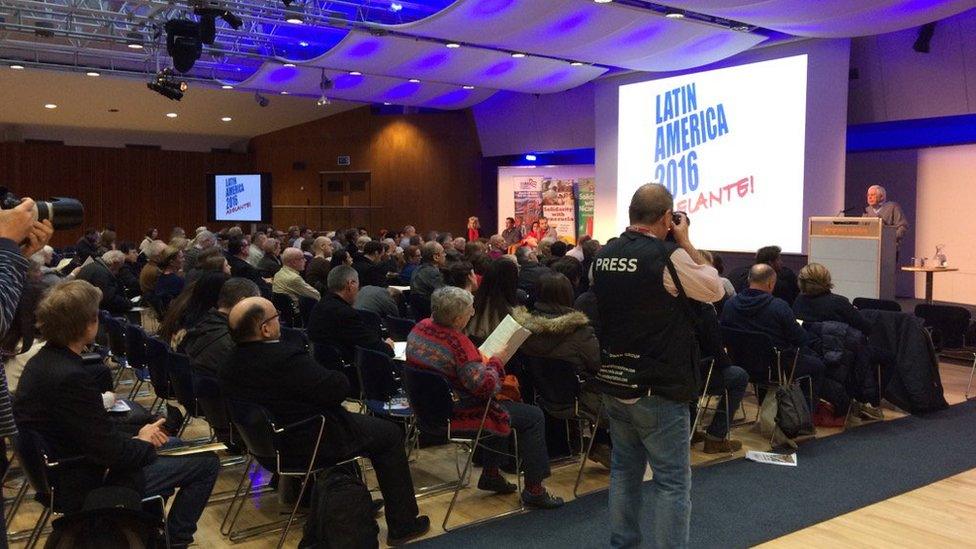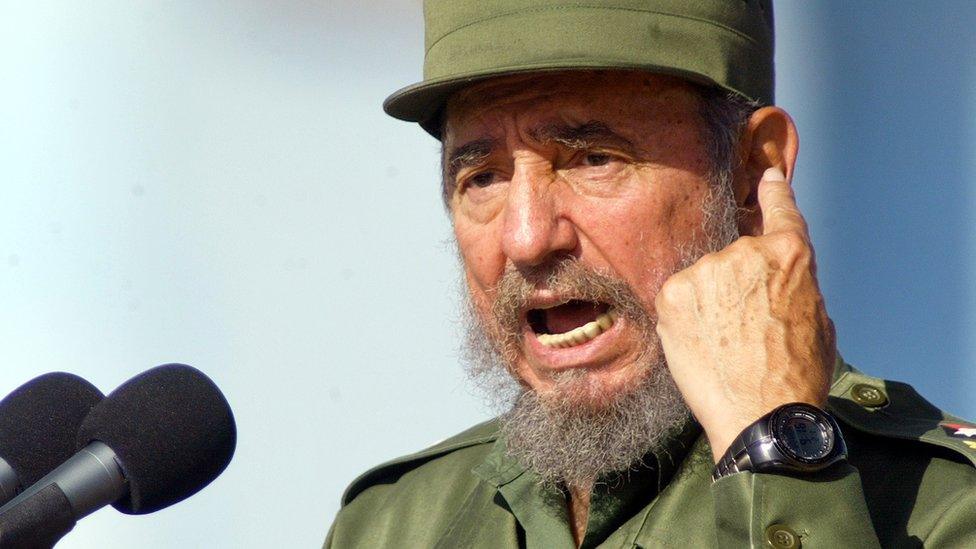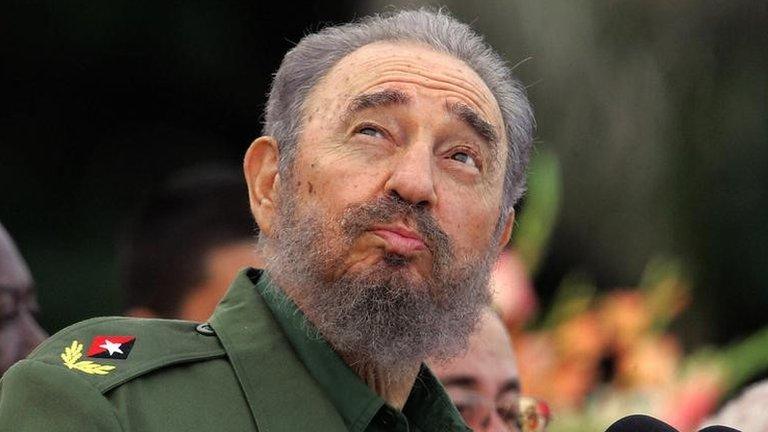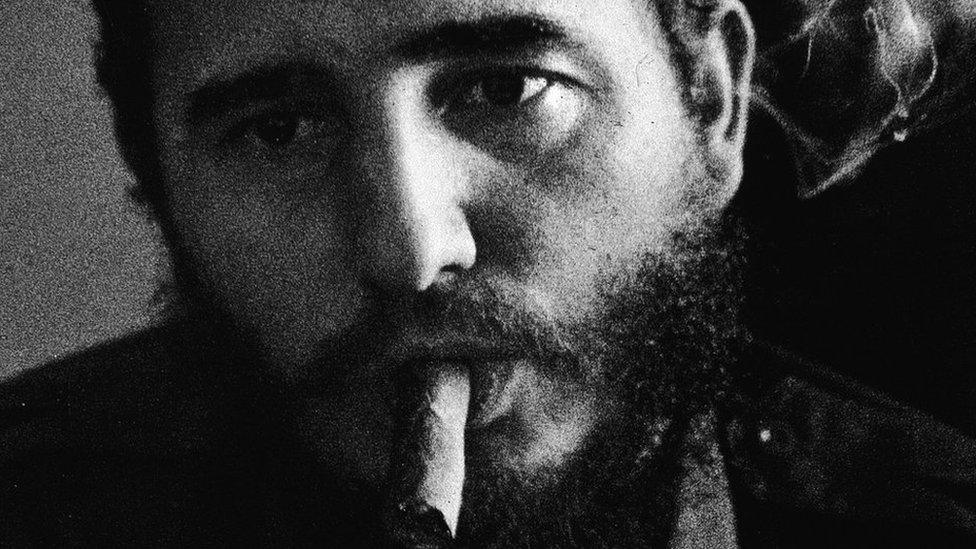Fidel Castro: Jeremy Corbyn praises 'huge figure'
- Published

Fidel Castro, who has died aged 90, was a "huge figure in our lives", Labour leader Jeremy Corbyn has said.
Mr Corbyn praised the former Cuban president's revolutionary "heroism", his presence on the world stage and Cuba's health and education systems.
Mr Castro's death was announced by his younger brother Raul Castro, his successor as president of Cuba.
Foreign Secretary Boris Johnson said Fidel Castro had been a "historic, if controversial figure".
Mr Johnson expressed the UK's condolences to the government and people of Cuba, and said Mr Castro's death marked "the end of an era for Cuba and the start of a new one for Cuba's people".
He added: "The UK will continue to work with the government of Cuba on a wide range of foreign policy priorities, including on human rights."
Fidel Castro: A life in pictures
Former Labour London mayor Ken Livingstone called Mr Castro an "absolute giant" of the 20th Century.
Former Labour MP George Galloway tweeted a picture of himself with Mr Castro, external, writing: "You were the greatest man I ever met Comandante Fidel. You were the man of the century."
But other senior Labour figures have been more critical.
'Outlasted'
Mr Corbyn, a long-time supporter of the Cuba Solidarity Campaign, external - which campaigns against the blockade on, and foreign intervention in, Cuba - described Mr Castro as a "huge figure of modern history, national independence and 20th Century socialism".
He said: "From building a world-class health and education system, to Cuba's record of international solidarity abroad, Castro's achievements were many.
"For all his flaws, Castro's support for Angola played a crucial role in bringing an end to apartheid in South Africa and he will be remembered both as an internationalist and a champion of social justice."
He acknowledged "there were problems and there are problems of excesses by all regimes" but "we have to look at the thing in its totality" and Mr Castro had "seen off a lot of US presidents".
But former Labour home secretary Jacqui Smith said the reason Mr Castro "'saw off' so many US presidents is because they're democratically elected".
And Labour MP Mike Gapes, a former chairman of the Commons Foreign Affairs Select Committee, highlighted a Human Rights Watch report that reported "much worse than just some 'problems and excesses' in Cuba".
'David and Goliath spirit'
In London, Latin American ambassadors, academics and activists had gathered at a conference, where they remembered Fidel Castro.
The Cuban ambassador to the United Kingdom, Teresita Vicente Sotolongo, described the former president as a "very warm person".
"I don't think we were ever prepared to think that he's not here in person, not with us. But I am confident his legacy we will go on," she said.
Rob Miller, from the Cuba Solidarity Campaign, met Fidel Castro as a teenager and described him as "charming" and "very interested in our lives".
"Fidel embodies that David and Goliath spirit that has seen Cuba develop its own ways and its own politics, its own destiny," said Mr Miller.
A book of condolence will be opened at the Cuban embassy in London.

At the scene

By Simon Jones, BBC News correspondent
By chance, London is today playing host to the Latin America Conference, described as the largest event of the year for Latin American solidarity in Britain. The start of proceedings were marked with a minute's silence, followed by applause as a tribute to Fidel Castro's life.
The Cuba Solidarity Campaign described him as a great man, who demonstrated that another world is possible, economically and politically. There is a real sense of sadness among delegates here, not least from the Cuban ambassador to the UK, Teresita Vicente, who looked visibly upset when talking about the two occasions on which she met Fidel Castro.
Everyone here knew he was old and has recently only rarely been seen in public, but many feel they have lost someone to look up to, an iconic figure, a David who took on the might of an American Goliath.
Ask about the criticisms of Castro, though, related to human rights and free speech, and they reply that this is a myth perpetrated by the US. Today, they want to talk about his achievements.

Mr Livingstone told Radio 4's Today programme: "Of course Fidel did things that were wrong. Initially he wasn't very good on lesbian and gay rights."
He stressed the health and education successes and even distribution of wealth under Castro, but said he believed over time Cuba would move towards "something like a traditional west European democracy".
Former Labour cabinet minister and anti-apartheid leader Peter Hain praised Cuban troops' defeat of South Africa's troops in Angola in 1988, as a "vital turning point in the struggle against apartheid".
But he added that Mr Castro was "criticised, rightly, for his attacks on human rights and curbs on free speech and his attitude towards gay Cubans which were indefensible".
This criticism was echoed by Tim Farron, the Liberal Democrat leader.
Mr Farron said whilst he was undoubtedly a significant leader, "we must not overlook the appalling human rights abuses including brutal summary executions for which he was responsible".
Paul Webster was the UK's ambassador to Cuba from 2001-2004 and is now an international relations lecturer at Boston University. He described the leader as "a good reader of human nature" which "helped him consolidate power".
But he warned of uncertainty in the future.
"For many Cubans its almost impossible to conceive of a world, a Cuba, without Fidel. So change will have to be carefully managed," he said.
- Published26 November 2016

- Published26 November 2016

- Published26 November 2016
- Published26 November 2016
